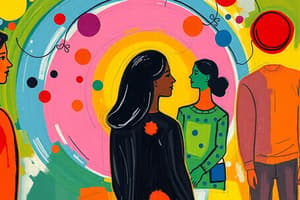Podcast
Questions and Answers
What is the smallest possible group in sociology called?
What is the smallest possible group in sociology called?
- Pair
- Tribe
- Clique
- Dyad (correct)
Sociology is primarily focused on individual behavior.
Sociology is primarily focused on individual behavior.
False (B)
Who first suggested the term sociology?
Who first suggested the term sociology?
Auguste Comte
Sociology shares with other ____________ an interest in human behaviour.
Sociology shares with other ____________ an interest in human behaviour.
Match the terms with their definitions:
Match the terms with their definitions:
Which of the following terms refers to the unequal distribution of rewards among society's members?
Which of the following terms refers to the unequal distribution of rewards among society's members?
Micro sociology focuses on large-scale social processes.
Micro sociology focuses on large-scale social processes.
What are the three components of culture mentioned?
What are the three components of culture mentioned?
Functionalism is concerned with the __________ of each element of the system.
Functionalism is concerned with the __________ of each element of the system.
Who developed the first modern social theory of stratification?
Who developed the first modern social theory of stratification?
Which of the following is NOT considered a primary agent of socialization?
Which of the following is NOT considered a primary agent of socialization?
Structural functionalism views society as a complex system whose parts work together to promote stability.
Structural functionalism views society as a complex system whose parts work together to promote stability.
What is social identity?
What is social identity?
The two major types of social groups are ______ and ______.
The two major types of social groups are ______ and ______.
Match the following sociological theories with their main focus:
Match the following sociological theories with their main focus:
What is anticipatory socialization?
What is anticipatory socialization?
Gender socialization begins at adulthood.
Gender socialization begins at adulthood.
Name one significant impact of media on socialization.
Name one significant impact of media on socialization.
A ______ is a temporary social group formed for a specific purpose.
A ______ is a temporary social group formed for a specific purpose.
Which of the following theorists is associated with conflict theory?
Which of the following theorists is associated with conflict theory?
Flashcards
Socialization
Socialization
The process by which individuals learn the values, beliefs, and behaviors of their society.
Primary agents of socialization
Primary agents of socialization
The agents, like families, that primarily influence a person's early socialization.
Secondary agents of socialization
Secondary agents of socialization
Agents, like schools or workplaces, that contribute to socialization later in life.
Anticipatory socialization
Anticipatory socialization
Signup and view all the flashcards
Nuclear family
Nuclear family
Signup and view all the flashcards
Social group
Social group
Signup and view all the flashcards
Primary group
Primary group
Signup and view all the flashcards
Secondary group
Secondary group
Signup and view all the flashcards
Conformity
Conformity
Signup and view all the flashcards
Norms
Norms
Signup and view all the flashcards
Society
Society
Signup and view all the flashcards
Status
Status
Signup and view all the flashcards
Social Inequality
Social Inequality
Signup and view all the flashcards
Macro Sociology
Macro Sociology
Signup and view all the flashcards
Bourgeoisie
Bourgeoisie
Signup and view all the flashcards
Role
Role
Signup and view all the flashcards
Social Institutions
Social Institutions
Signup and view all the flashcards
Symbolic Interactionism
Symbolic Interactionism
Signup and view all the flashcards
Conflict Theory
Conflict Theory
Signup and view all the flashcards
Study Notes
Socialization
- Socialization: The process of learning and internalizing the norms, values, beliefs, and behaviors of a society.
- Primary Agents of Socialization: Individuals or groups that influence a person's development in early life, such as family.
- Secondary Agents of Socialization: Individuals or groups that influence a person's development after childhood, including peers, media, and institutions.
- Family's Role in Socialization: Family significantly shapes an individual's values, attitudes, and behaviors.
Basic Social Institutions
- 5 Basic Social Institutions: Family, education, religion, economy, and government.
Macro vs. Micro Sociology
- Macro Sociology: Examines large-scale social structures and systems.
- Micro Sociology: Studies small-scale interactions and patterns.
Social Institutions
- Purpose of Social Institutions: Meet society's basic needs.
Auguste Comte & Emile Durkheim
- Auguste Comte: Considered a founder of sociology.
- Emile Durkheim: Known for his work on social solidarity and the division of labor in society.
Sociology Theories
- Structural Functionalism: Emphasizes the interconnectedness of societal elements, focusing on their functions.
- Conflict Theory: Highlights power struggles and inequalities in society.
- Feminist Theory: Focuses on gender inequality and discrimination.
- Symbolic Interactionism: Examines how individuals create meaning and interact in society.
Symbols, Values, Norms
- Symbols: Represent something else (e.g., a flag).
- Values: Beliefs about what is important in society.
- Norms: Rules of behavior.
Law Enforcement & Prisons
- Policing, Prisons, and Rehabilitation: Types, functions, and goals of law enforcement, prisons, and rehabilitation.
Division of Labor & Changes in Policing
- Division of Labor: How tasks are divided in a society.
- Changes in Policing: Progression and shifts in policing strategies, tactics, and approaches.
Work & Alienation (Marx)
- Work & Alienation: Marx's concept of alienation in the workplace.
Primary Agent of Socialization: Family
- Types of Families: Nuclear, same-sex, lone-parent, extended.
- Family Changes: Evolution and shifts in family structures.
- Family Roles: Roles within different family structures and dynamics.
- Status: Position within society (e.g., social class, occupation).
- Nuclear Family: Two parents and their children.
- Traditional Nuclear Family: Specific and conventional form of a nuclear family.
- Same-Sex Family: Families involving same-sex couples.
- Lone-Parent Family: Family headed by a single parent.
Abnormal Socialization
- Importance of Family in Early Socialization: Family's role in early development and societal contribution.
- Genie Wiley, Oxana: Cases of extreme isolation and deprivation, highlighting the significance of early socialization.
Secondary Agents of Socialization
- Secondary Agents: Institutions and groups after childhood.
- Role of Secondary Agents: Influence on values, beliefs, and behaviors after childhood.
- Anticipatory Socialization: Preparing for future roles in society (e.g., occupation).
Media & Socialization
- Cultural Diffusion: Spread of culture across societies.
- Global Village: Interconnectedness of communities through media.
- Media Impacts on Socialization: How media shapes individuals' beliefs, attitudes, behaviors, norms, and values.
- Social Learning Theory: Albert Bandura's theory of learning.
- Children & Media Violence: Impact of media violence on children's behavior.
- Gender & Socialization: How gender roles are learned and reinforced, and impact.
- Tough Guise: The idea and approach to evaluating and understanding the roles played by men and masculinity in modern society.
Social Identity & Theories
- Social Identity: The aspects of self that are derived from group memberships.
- Sex vs. Gender: Distinction between biological sex and social gender.
- Gender Stereotype: Oversimplified generalizations about gender.
- Gender Role: Social expectations for behavior based on gender.
- Gender Socialization: Process of learning and internalizing gender roles.
Groups & Group Behavior
- Social Group: Two or more people who interact regularly and share a sense of identity.
- Reasons for Joining Groups: Shared interests, goals, and belonging.
- Types of Groups: Primary and secondary groups, in-groups, out-groups.
- Conformity: Adjusting one's behavior to match group norms.
- Mores: Moral rules or standards of behavior.
- Folkways: Customs or social habits.
- Sanctions: Punishments or rewards imposed for adhering to norms or deviating from them.
- Factors Influencing Conformity: Group size, group cohesiveness, unanimity.
- Dyad: Group of two.
- Clique: Group of relatively close friends or acquaintances.
- Rules/Norms/ Laws: Societal expectations and guidelines.
- Sanctions (cont.): Punishments or rewards related to adherence or deviations.
- Effects of Group Membership: Impacts on attitude, behavior, and perceptions.
- Crowd Types: Conventional, expressive, acting, mob, riot.
- Social Movements: Organized collective actions to promote or resist change.
Other Sociology Concepts
- Sociology's Relation to Other Social Sciences: How sociology overlaps but differs from relevant subjects.
- Sociology Disciplines: The macro and micro approaches to sociological study, and their relative focuses.
- Social Group Characteristics: Shared traits and characteristics of social relationships.
- Smallest Group: The dyad.
- Group Intimacy: The spectrum and measurement of intimacy in group interactions.
- First Sociology Term: Suggested by Auguste Comte.
- High Suicide Rates: Reflect weakness among social cohesion.
- Culture, Society, Social Relationship: Essential sociological concepts.
- Importance of Culture: Components of culture including norms, values, and statuses.
- Status: Social position or rank within a group.
- Status, Achieved, Norms: Explanation of these concepts.
- Social Stratification: Unequal distribution of resources.
- Social stratification: Hierarchical grouping in society.
- Norms vs. Values: Defining feature of these important concepts in social sciences.
- Functionalism: Societal elements' role in maintaining the whole system in a social context.
- Conflict Theory (cont.): Examination of power struggle among competing groups in a society.
- Micro Theory Example: Symbolic interactionism.
- Key Concept of Symbolic Interactionism: Importance of symbols which stand for something else.
Key Figures
- George Herbert Mead, Herbert Blumer: Pioneers of symbolic interactionism.
- Karl Marx: Focused on social class from an economic perspective.
- Max Weber: Focused on social class.
- W.E.B. Du Bois: Made significant contributions to racial injustice.
Isolation & Deprivation
- Socialization: Critical learning process in acquiring culture and social interactions.
- Isolation & Deprivation Examples: Cases like Genie Wiley and Oxana.
Studying That Suits You
Use AI to generate personalized quizzes and flashcards to suit your learning preferences.




